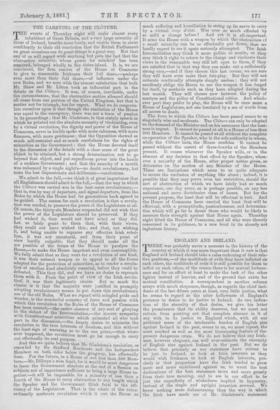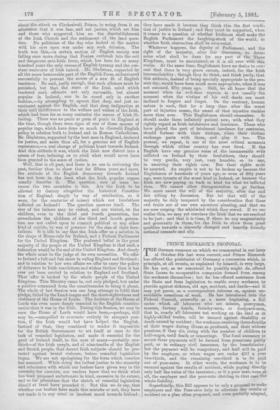ENGLAND AND IRELAND.
THERE was probably never a moment in the history of the country at which it was more important than it now is that England and Ireland should take a calm reckoning of their rela- tive positions,—of the multitude of evils they have inflicted on each other, the multitude of evils it is still possible for them to inflict on each other, of the reason there is for mutual forbear- ance and for an effort at least to make the task of the other lighter instead of heavier, and of the ground that exists for mutual conciliation. A correspondent in another column arrays with much eloquence, though, as regards the chief inci- dents of the last fifteen years at least, very little justice, what he seems to regard as the utter hollowness of England's pretence to desire to do justice to Ireland. As one indica- tion of the sincerity of that desire, we give his letter the prominence that its ability deserves, but we must not refrain from pointing out that complete absence in it of any wish to do justice to England which, with all our profound sense of the intolerable burden of English gins against Ireland in the past, seems to us, wo must repeat, the most marked as well as the most threatening feature of the present dangerous crisis. We do not believe that any Irish- man, however eloquent, can well over-estimate the enormity of English sins against Ireland in the past. But we do believe that precisely as our statesmen have striven to bo just to Ireland, to look at Irish interests as they would wish Irishmen to look at English interests, pre- cisely in that proportion have the Irish tended to grow more and more embittered against us, to wrest the best declarations of the best statesmen more and more grossly from their true meaning, and to see in our effort to be just the superfluity of wickedness implied in hypocrisy, instead of the single and upright intention avowed. We know nothing more disheartening than the way in which the Irish have made use of Mr. Gladstone's statement
about the attack on Clerkefiwell Prison, to wring from it an admission that it was fear, and not justice, which set him and those who supported him on the disestablishment of the Irish Church and the settlement of the land ques- tion, No politician of the day who looked at the matter with his eyes open was under any such delusion. The truth was this,--a certain section of English society was falling once more during that Fenian outbreak into the evil and dangerous anti-Irish fever, which has been for so many hundred years the only excuse of English tyranny and the con- stant renovator of Irish hatred. Mr. Gladstone, supported by all the more honourable part of the English Press, endeavoured successfully to prevent the access of a new fit of English insolence. He said, justly enough, that such offences must be punished, but that the state of the Irish mind which rendered such offences not only excusable, but almost popular in Ireland, was to be cured only in another fashion,—by attempting to uproot that deep and just re- sentment against the English, and that deep indignation at their cold indifference to the welfare and wishes of the Irish, which had been for so many centuries the source of Irish ill- feeling. There was no panic or germ of panic in England at the time, though there were signs of one of those spasms of popular rage, which have done so much to discredit English policy in relation both to Ireland and to Roman Catholicism. Mr. Gladstone, supported by the best men in England, declared for justice, and more than all, for a genuine act of English repentance,—a real change of political heart towards Ireland. And this attitude it was, which the Irish now distort into a spasm of fear, inducing us to yield what would never have been granted to the sense of justice.
Well, that is all past, and there is no use in reviewing the past, further than to show that for fifteen years and more, the attitude of the English democracy towards Ireland has not been in the least what the Irish popular organs usually describe it. The question now at issue be- tween the two countries is this. Are the Irish to be allowed to destroy altogether the historical Constitu- tion of England, simply by way of retribution, as it were, for the centuries of misery which our forefathers inflicted on Ireland ? The question answers itself. The sins of the fathers may be visited, and are visited, on the children, even to the third and fourth generation, but nevertheless the children of the third and fourth genera- tion are not called upon to commit political or any other kind of suicide, by way of penance for the sins of their fore- fathers. It is idle to say that the Irish offer us a solution in the shape of Home-rule for Ireland, and a Federal Parliament for the United Kingdom. The profound belief in the great majority of the people of the United Kingdom is that such a federation would be the end of the United Kingdom. And clearly the whole must be the judge of its own necessities. We offer to Ireland a full and fair share in ruling England and Scotland ; and in relation to her own affairs we offer to carry the policy of deference to Irish convictions and wishes farther than it has ever yet been carried in relation to England and Scotland. That offer is backed by the whole people of the United Kingdom. This Ministry came in, not only pledged, but under a positive command from the constituencies to bring it about. The whole of last Session was one long attempt to fulfil that pledge, foiled by the Land-league and the short-sightedness and obstinacy of the House of Lords. The decision of the House of Lords was even more deeply resented in the English constitu- encies than it was in the Irish. During this Session, we may be sure, the House of Lords would have been,—perhaps, still may be,—compelled to evacuate entirely its arrogant posi- tion, if the Irish would but have helped the English. Instead of that, they combined to render it impossible for the British Government to set itself at once to the task of remedial legislation, and made it essential for the good of Ireland itself, in the eyes of many—probably one- third—of the Irish people, and of nine-tenths of the English and Scotch people, that decent Irish subjects should be pro- tected against brutal violence, before remedial legislation began. We are not apologising for the form which coercion has assumed. While doing the fullest justice to the sincerity and reluctance with which our leaders have given way to the necessity for coercion, our readers know that wo think what has been proposed unfortunate in kind, excessive in its extent, and so far premature that the sketch of remedial legislation should at least have preceded it. But this we do say, that whether our leaders have made this mistake or not, they have not made it in any cruel or insolent mood towards Ireland ; they have made it because they think this the first condi- tion of justice to Ireland ; and they must be supported, when it comes to a question of whether Irishmen shall make the English Parliament the laughing-stock of the world, or whether Irish obstruction shall be over-ruled.
Whatever happens, the dignity of Parliament, and the right of the majority, after fair discussion, to deter- mine what shall be done for any part of the Three Kingdoms, must be maintained, or it is all over with this realm. At the same time, Englishmen have no desire to con- ceal that there is very grave excuse, indeed, for the Irish irreconcilability ; though they do think, and think justly, that this attitude, instead of being specially appropriate to the pre- sent day, would have been much more appropriate, when it was not assumed, fifty years ago. Still, we all know that the moment when an evil-doer repents is not usually the moment when the victims of his evil deeds are most inclined to forgive and forget. On the contrary, human nature is such, that for a long time after the worst part of injustice ceases, the smart of that injustice rankles more than ever. This Englishmen should remember. It should make them infinitely patient now, with what they rightly regard as Irish intolerance and insolence. Those who have played the part of intolerant insolence for centuries, should forbear with their victims, when their victims exchange parts with them, and play it too. The present, we repeat, is one of the most critical moments
through which either country has ever lived. If the English have any genuine sense of the innumerable evils inflicted on Ireland by their forefathers, they should be very gentle, very just, very humble, so to say, in asserting their rights now. But their rights must be asserted. An empire is not to be broken up because the Englishmen of hundreds of years ago, or even of fifty years ago, were tyrants of the worst kind in Ireland, or because the Irish are now paying us back in kind for what we inflicted then. We cannot allow disorganisation to go further. We must assert the will of the majority, after due and fair sifting by discussion. But let that will of the majority be duly tempered by the consideration that these evil fruits are of our own ancestors' planting, and that we are now reaping the whirlwind which they sowed. If we can realise this, we may yet convince the Irish that we are resolved to be just ; and that it is time, if there be any magnanimity and generosity in them, for the Irish to show these great qualities towards a sincerely changed and heartily friendly national comrade and ally.



































 Previous page
Previous page